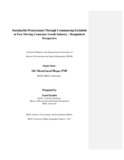| dc.contributor.advisor | Hoque, Md. Mosta Gausul | |
| dc.contributor.author | Tasnim, Zarin | |
| dc.date.accessioned | 2017-10-02T04:52:58Z | |
| dc.date.available | 2017-10-02T04:52:58Z | |
| dc.date.copyright | 2017 | |
| dc.date.issued | 2017-03-01 | |
| dc.identifier.other | ID 15182018 | |
| dc.identifier.uri | http://hdl.handle.net/10361/8481 | |
| dc.description | This dissertation is submitted in partial fulfillment of the requirements for the degree of Masters in Procurement and Supply Management, 2017 | en_US |
| dc.description | Cataloged from PDF version of thesis. | |
| dc.description.abstract | This dissertation was prepared to find weather implementing eco-labels in FMCG industry
will be an appropriate step in the context of present consumer market in Bangladesh or not
and to recommend ways of increasing the practice of eco-label implementation.
It provides an analysis and evaluation of the current trend of consumer behaviour, level of
awareness among the consumers, their level of income and pricing concerns related to ecolabelling
issues of the top three superstores of Bangladesh- Shwapno, Agora and
meenaBazar. All calculations can be found in the data analysis and appendices. Results of
data analysed show that the response from the consumers are not up to the expectations . In
particular, the level of awareness regarding eco-labelling prospects among the consumers was
poor.
This dissertation draws attention to the facts that
19%, a very significant portion of the total respondents admitted, they know nothing at
all about this phenomenon! And another major portion of the total number of
respondents.
25.9% of them said they have ‘poor’ knowledge on this issue.
36.2% of them ‘Never’ checks for eco-labels
32.8% selected ‘not so frequently’ when they were asked how often they check for Ecolabels.
44.8% of the respondents do not bother to be influenced while buying products even if it
bears eco-label.
Eco-labels do not leave any impact on 44.8% of the end users!
Only 18% of the total respondents said eco-label influences their buying decision.
When they were asked about implementation of eco-labels in retail industry – 56.9% of
the respondents answered –they think it will be an appropriate step.
74.14% of the respondents have a monthly income of BDT 50000-80000
22.41% of them are not ready to pay any higher price and 8.62% of them are not even
sure whether they are willing or not.
Discounts/offers on products bearing eco-labels, 50% of the total respondents (29
respondents) opted for it.
Advertisement on print media, 34.5%(20 respondents) of the total number said so.
According to 15.5% of the total respondents presumed, arranging road show can be
another effective way.
And most importantly, unlike the dissertation hypothesis, there is a negative
correlation between the level of income and willingness of the customers
to buy eco-labelled products.
Considering our surroundings in Bangladesh, major recommendation is:
Increasing awareness raising activities under public and private patronization.
This dissertation also declares the fact that the analysis conducted has limitations. Some of
the limitations include:
Sample size could not include all the superstores functioning within Bangladesh.
The author is not an expert in statistical data analysis and consequently there might be
lack of accuracy in data analysis. | en_US |
| dc.description.statementofresponsibility | ZarinTasnim | |
| dc.format.extent | 82 pages | |
| dc.language.iso | en | en_US |
| dc.publisher | BRAC Univeristy | en_US |
| dc.rights | BRAC University dissertation reports are protected by copyright. They may be viewed from this source for any purpose, but reproduction or distribution in any format is prohibited without written permission. | |
| dc.subject | Eco-labels | en_US |
| dc.subject | Consumer | en_US |
| dc.title | Sustainable procurement through commencing ecolabels in fast moving consumer goods industry : Bangladesh perspective | en_US |
| dc.type | Thesis | en_US |
| dc.contributor.department | BRAC Institute of Governance and Development, BRAC University | |
| dc.description.degree | M. Procurement and Supply Management | |

